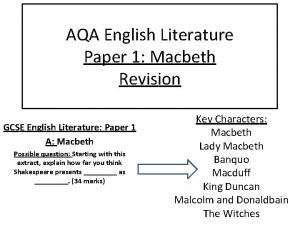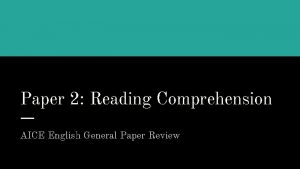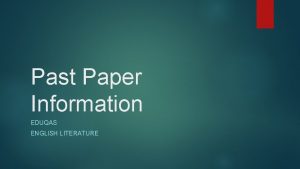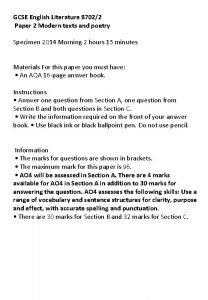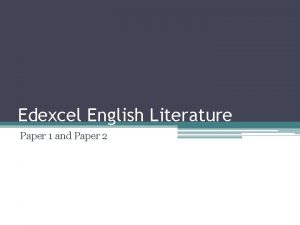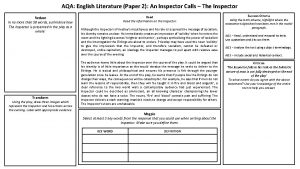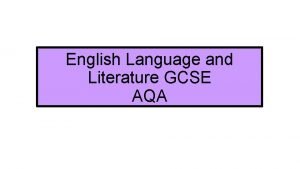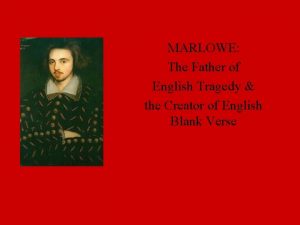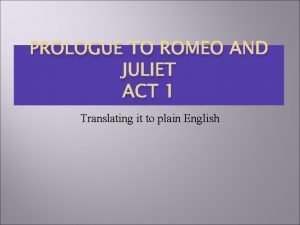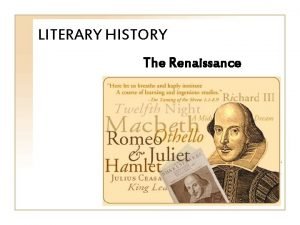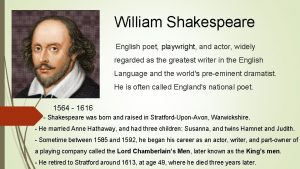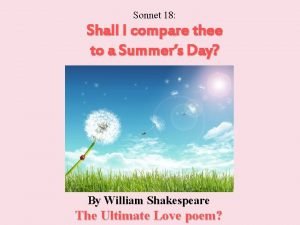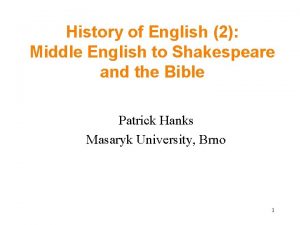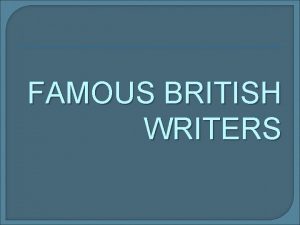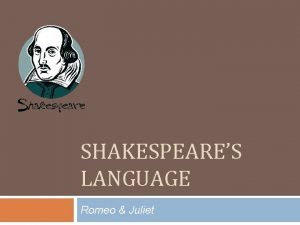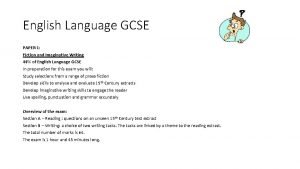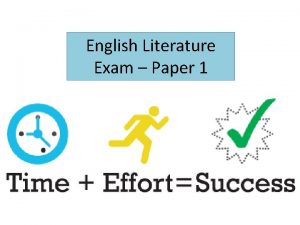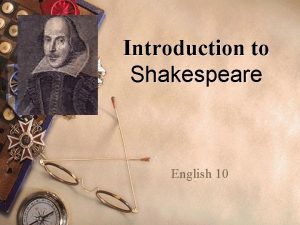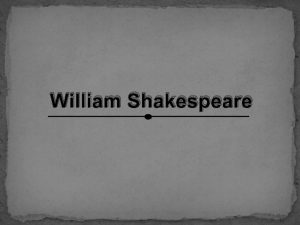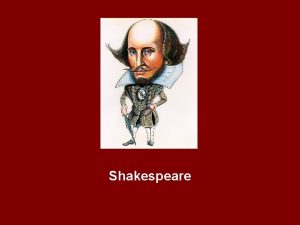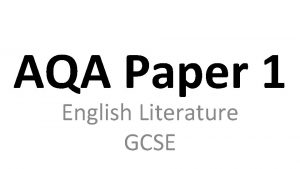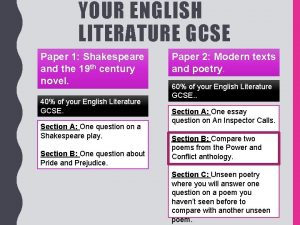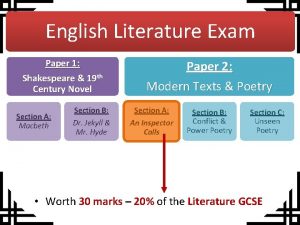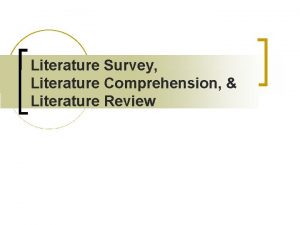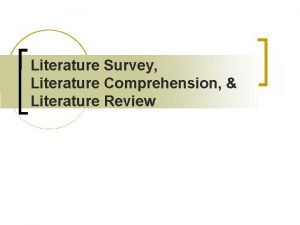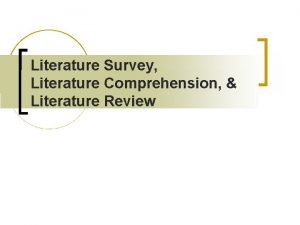Paper 1 English Literature SHAKESPEARE AND THE 19


















- Slides: 18

Paper 1 English Literature SHAKESPEARE AND THE 19 TH CENTURY NOVEL

Overview of the paper �Paper 1 – 1 hr 45 mins � 2 sections �Section A = Romeo and Juliet /3 o marks + 4 for SPAG �Section B = Jekyll and Hyde /30 marks Total = 64

Preparing for R&J exam questions The question takes the form of an extract and a two part question, the first asking you to explore a theme, character or interpretation in the extract, the second how this is presented in the play as a whole.

What you are marked on �AO 1 – Explore and evaluate the ideas in the text with well chosen quotations. �AO 2 – Analyse the methods writer’s use using appropriate subject terminology. �AO 3 – Explore the big ideas/perspectives/context in the text.

Preparing for R&J exam questions • Read your extract and question • Annotate the extract for the focus of the question – remember to pick out METHODS to show HOW Shakespeare presents…. • Discuss how this focus is presented throughout the play • Make a detailed essay plan for the second part of the question, showing which scenes you would go to for evidence of the question focus, with specific quotes and notes on how it presents the character or idea

Romeo and Juliet Read the following extract from the start of Act 5 Scene 3 of Romeo and Juliet and then answer the question that follows. At this point in the play Juliet awakes to find Romeo has poisoned himself. JULIET Go, get thee hence, for I will not away. He exits. What’s here? A cup closed in my true love’s hand? Poison, I see, hath been his timeless end. — O churl, drunk all, and left no friendly drop To help me after! I will kiss thy lips. Haply some poison yet doth hang on them, To make me die with a restorative. She kisses him. Thy lips are warm! Enter Paris’s Page and Watch. FIRST WATCH Lead, boy. Which way? JULIET Yea, noise? Then I’ll be brief. O, happy dagger, This is thy sheath. There rust, and let me die. She takes Romeo’s dagger, stabs herself, and dies. Starting with this extract, explore how Shakespeare presents fate versus free will in Romeo and Juliet. Write about: • how Shakespeare presents fate versus free will in this extract. • how Shakespeare presents fate versus free will in the play as a whole. [30 marks] AO 4 [4 marks]

Fate versus free will JULIET Go, get thee hence, for I will not away. He exits. (Friar Lawrence) So, any language connected with fate or free will? What kind of themes, ideas, abstract nouns might be relevant to fate or free will? What’s here? A cup closed in my true love’s hand? Poison, I see, hath been his timeless end. — Are any of these examples O churl, drunk all, and left no friendly drop of other language devices or To help me after! I will kiss thy lips. lexical fields? Haply some poison yet doth hang on them, To make me die with a restorative. She kisses him. Thy lips are warm! Enter Paris’s Page and Watch. FIRST WATCH Lead, boy. Which way? How are they relevant to this extract and the play as a whole? JULIET Yea, noise? Then I’ll be brief. O, happy dagger, This is thy sheath. There rust, and let me die. She takes Romeo’s dagger, stabs herself, and dies.

Fate versus free will JULIET Go, get thee hence, for I will not away. Taking decisions – Juliet as powerful; defiant He exits. (Friar Lawrence) Death as timeless – could suggest having been predetermined, always going to happen, unavoidable, ‘timeless end’ oxymoron. What’s here? A cup closed in my true love’s hand? Sense of fate, meant to be; Poison, I see, hath been his timeless end. — more powerful than family O churl, drunk all, and left no friendly drop rivalry To help me after! I will kiss thy lips. Haply some poison yet doth hang on them, To make me die with a restorative. She kisses him. Thy lips are warm! Enter Paris’s Page and Watch. FIRST WATCH Lead, boy. Which way? Juxtaposition of life and health with death – death as help to next world; positive; inevitable JULIET Yea, noise? Then I’ll be brief. O, happy dagger, Her as an object; a vessel – This is thy sheath. There rust, and let me die. suggestive of context of She takes Romeo’s dagger, stabs herself, and dies. female lack of role without Language associated with man, as well as possession decay and time beyond and pawn of God human experience

Plans You could: �Or: �Para 1 – close analysis of �Close analysis/text as a extract �Para 2 – close analysis of extract �Para 3 – The text as a whole. �Para 4 – The text as a whole. �Close analysis/text as a whole.

Writing it up �Your paragraphs should: � 1. Have a clear point that uses the key words of the question. � 2. Use a range of evidence. � 3. Explore, analyse and interpret in as much detail as possible. � 4. Use subject specific terminology – techniques!

Example � In the extract, Shakespeare presents fate and free will as opposing forces, battling against one another. Shakespeare begins by presenting Juliet using active, controlling language, she says ‘go, get thee hence, for I will not away. ’ The imperatives ‘go’ and ‘get’ emphasise the way that Juliet is now taking control of her destiny and trying to assert her free will. The phrase ‘I will not away’ also underlines her refusal to be passive and accept her fate. This sense of free will is contrasted with a sense of fate. Juliet uses imagery that suggests death is inevitable and even positive. For example, ‘no friendly drop to help me’ to make me ‘die with a restorative. ’ The idea of the personified ‘friendly’ poison suggests death is a mere help to the next life rather than something to be feared.

Play as a whole – fate/free will: Where in the play might we go for these ideas?

The novel as a whole �Try to think of 2 -3 other examples of. Ideas about free will in the whole text.

Prologue “star-cross’d lovers” + fact that story revealed in prologue – structural point (reflects inescapability of fate) ROMEO I fear, too early, for my mind misgives Some consequence yet hanging in the stars (Romeo senses something will happen before the party at the Capulets) � Romeo: “I defy you stars” (Romeo constantly fighting against his own destiny) • Romeo: “I am fortune’s fool” (yes, he is) • JULIET Go ask his name. The Nurse goes. If he be marrièd. My grave is like to be my wedding bed. (Juliet foreshadows her own death when she first sees Romeo)

Paragraphs about the text as a whole � Aim to use a couple of quote. Talk about at least two other parts of the play if you can. � E. g. � In the play as a whole, there is frequent reference to the idea of fate being inescapable and inevitable. The prologue is used as a structural device that immediately reveals the way that fate can’t be escaped. The storyline is revealed and the idea of ‘star crossd lovers’ reflects the Elizabethan belief in astrology (that the stars determine our destiny). Furthermore, both Romeo and Juliet make frequent reference to their own fates. Before the Capulets party Romeo talks of ‘some consequence yet hanging in the stars’ which emphasises his knowledge of is fate. Similarly, Juliet foreshadows her own death when she sees Romeo for the first time – ‘If he be marrièd. My grave is like to be my wedding bed’. Overall, Shakespeare presents fate as dominating the life and love of both Romeo and Juliet.

Jekyll and Hyde �The exact same process applies to Jekyll and Hyde. � Spend 50 minutes. 10 mins annotating and planning, 35 mins writing and 5 mins checking.

Annotation Writer’s ideas Language/structure Context and genre What is the writer trying to convey? Techniques – Simile, metaphor, personification, lexical field…. Ideas concerning Victorian morality/the Victorian gentleman and the repression that comes from that. What do we learn about character? How does it relate to the big ideas and themes in the text? Word class – adjectives/verbs…. . Science vs religion Structural features Repetitions/patterns/motifs The rise of evolution Duality Physiognomy

Annotation Writer’s ideas Language/structure Context and genre What is the writer trying to convey? Techniques – Simile, metaphor, personification, lexical field…. Aristotelian tragedy – tragic heroes’ fated to death. The audience feels catharsis at the end. What do we learn about character? How does it relate to the big ideas and themes in the text? Word class – adjectives/verbs…. . Structural features Repetitions/patterns/motifs Astronomy – in Elizabethan England people believed that their destiny was determined by the stars. Family hierarchy/the right of fathers – There was a rigid and strict family structure in which the father was the authoritarian, patriarch at the head of the household.
 English literature paper 1 macbeth
English literature paper 1 macbeth Paper 2 aice general paper
Paper 2 aice general paper Eduqas english literature past papers
Eduqas english literature past papers Modern text english literature
Modern text english literature Edexcel language paper 2
Edexcel language paper 2 English literature paper 2 an inspector calls
English literature paper 2 an inspector calls Aqa english literature paper 1 2019 a christmas carol
Aqa english literature paper 1 2019 a christmas carol Ac swinburne appreciated marlowe as father of english
Ac swinburne appreciated marlowe as father of english Two households, both alike in dignity
Two households, both alike in dignity Literature william shakespeare
Literature william shakespeare Ib chinese a language and literature
Ib chinese a language and literature Aice general paper example essay
Aice general paper example essay William shakespeare english poets
William shakespeare english poets English sonnet
English sonnet Middle english shakespeare
Middle english shakespeare ? what famous writed was born in 1564?
? what famous writed was born in 1564? Shakespeare biography english
Shakespeare biography english Blank verse example romeo and juliet
Blank verse example romeo and juliet English fiction and imaginative writing
English fiction and imaginative writing
